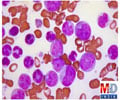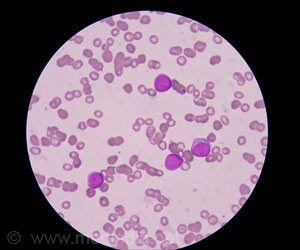Research on the drug responses of leukemia stem cells may reveal why some attempts to treat are not successful or why initially promising treatment results are not sustained.

‘Advances in rapid screening of leukemia cells for drug susceptibility and resistance are bringing scientists closer to patient-tailored treatment for acute myeloid leukemia (AML).’





Leukemia stem cells - the progenitors for the immature, cancerous blood cells - propagate AML, and also play a role in the cancer returning after treatment. Cancer researchers are interested in how genes are expressed in this cell population, because this data may hold clues to resistance to standard therapies and answers to why some patients relapse. A study presented at the 60th Annual Meeting of the American Society of Hematology in San Diego looked at the drug response patterns of stem cells and blast cells taken from individual patients diagnosed with acute myeloid leukemia. The information was gathered through high throughput screening, a state of the art method for quickly evaluating and testing many samples.
The researchers found that leukemia stem cells and blast cells diverged in their drug susceptibility patterns, and also that these patterns differed from patient to patient.
For example, blast cells s responded in the test to the drugs most commonly used to treat patients, but none were effective against leukemia stem cells. The researchers did find 12 drugs from eight classes that seemed to preferentially target leukemia stem cells, compared to blast cells. Many of them are not often used in patients with this type of cancer.
The multidisciplinary team on the project included stem cell biologists, hematologists, medical oncologists, pathologists, computer scientists, drug developers and others.
Advertisement
In the laboratory study, the researchers compared the drug sensitivity of blast cell and stem cell populations taken from the same six patients. In doing so, they tested a custom panel of drugs, targeted agents and drug combinations on the cells, and did genetic analyses for 194 mutations. The panel included both FDA approved and investigational drugs.
Advertisement
Source-Eurekalert













